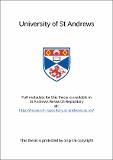Role of ubiquitin-like modification during adenovirus infection
Abstract
SUMO-1 is a small ubiquitin like protein that can be covalently linked to lysine residues in target substrates with a range of biological consequences. Following viral infection, various cellular mechanisms are subverted. In particular, it has been demonstrated that in adenovirus infected cells SUMO-1 conjugated proteins accumulate. This is exemplified by the cellular substrate RanGAP where an increase in the SUMO-1 conjugated form of the protein is detected. In addition it has been shown that two adenovirus gene products, E1B-55kDa and protein V, undergo SUMO-1 conjugation. Indeed, from in vivo and in vitro experiments, it appears that ElB-55kDa is mono-SUMO-1 modified, while protein V seems to be a substrate for multiple SUMO-1 conjugation. Immunofluorescence studies have indicated that there are sites in the nucleus where ElB-55kDa and SUMO-1, and protein V and SUMO-1, colocalise. To establish the basis for the observed changes in SUMO-1 modification the metabolism and cellular localisation of the enzymes involved in SUMO-1 conjugation were examined. While the total amount of SUMO-1 activating enzyme was not altered by adenovirus infection it was noted that a number of higher molecular weight species of the protein were induced by the virus. However the cellular localisation of the protein was not altered by adenovirus infection. Western blotting indicated that Ubch9 was not modified, but after infection the cellular localisation of the protein was altered from diffuse nuclear to a highly punctuate distribution. These changes suggest that adenovirus infection alters the activity and/or cellular localisation of the enzymes involved in SUMO-1 conjugation. It was also noted that adenovirus infection induced activation of the transcription factor NF-kB. This appeared to result from a dramatic increase in the ubiquitination and turnover of the IkBα inhibitor protein. After adenovirus induced nuclear translocation, NF-kB was sequestered into discrete subnuclear sites, which may alter the activity of the protein. Together these data indicate that ubiquitin-like protein modifications are important cellular functions that are targeted by viral activities after infection.
Type
Thesis, MPhil Master of Philosophy
Collections
Items in the St Andrews Research Repository are protected by copyright, with all rights reserved, unless otherwise indicated.

